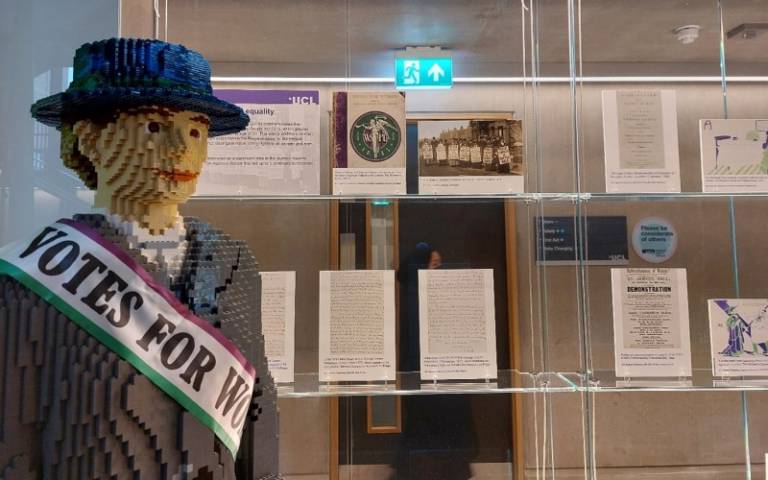Standing with Hope for equality
25 February 2022
An exhibition in the UCL Student Centre aiming to inform and generate discussion on past and current gender inequalities.

Stand with Hope
From 14 February to 7 March 2022, the UCL Student Centre is hosting the House of Commons’ ‘Hope the Lego Suffragette’, a life-size Lego figure built to help tell the story of inequalities and the campaign for universal suffrage leading to the Representation of the People (Equal Franchise) Act 1928.
Hope’s visit to UCL aims to inspire reflection on the history of the women’s suffrage movement, as well as creating a space for challenging conversations, hearing untold stories, and for UCL academics to share their research on gender inequalities.
Dangers and Delusions
The Student Centre is also hosting two exhibitions from UCL Special Collections.
Items from our Dangers and Delusions exhibition examine the movement calling for women's right to vote in the United Kingdom, including satirical commentaries, campaign literature, personal notes and petitions.
The struggle was drawn out over several decades, generating intense differences of opinion, not only between those for and against electoral equality, but also within pro- and anti-suffrage campaigns. It culminated in the first legislative step towards equality for women in 1918, followed ten years later by the 1928 Act.
The Stand with Hope campaign raises awareness of the fact that the struggle for gender equality is ongoing. UCL Pro-Provost (Equity & Inclusion) and Executive Dean of Social & Historical Sciences Professor Sasha Roseneil said: “Nearly a century after women were granted the vote on equal terms with men, the attainment of full and equal citizenship for all women remains an unfulfilled dream.”
Liberating the Collections
Reproductions of collection items identified by Special Collections' recent Liberating the Collections project are also on display.
In 2021, the team set up a project to uncover the voices of marginalised groups that have been hidden within our historical collections.
13 volunteers searched the catalogue for books, pamphlets and journals that relate to the experiences of people from marginalised groups. Focusing on topics such as women book owners, same sex love and desire and BAME authors, they compiled a list of 650 books from the collections that provide glimpses into some of those obscured histories.
Erika Delbecque Rare Books Librarian said:
“The Liberating the Collections project has only scratched the tip of the metaphorical iceberg, but already we are finding treasures as the ice starts to melt.”
Listing items that relate to underrepresented and marginalised groups is only the first step in amplifying these voices. Through updating our catalogue records with the findings of the volunteers, we will make these items easier to discover. We are also planning to digitise some of these items so that they are freely available online, and we are using the list as a basis to diversify the items we use in our exhibitions, classes and events.
 Close
Close

